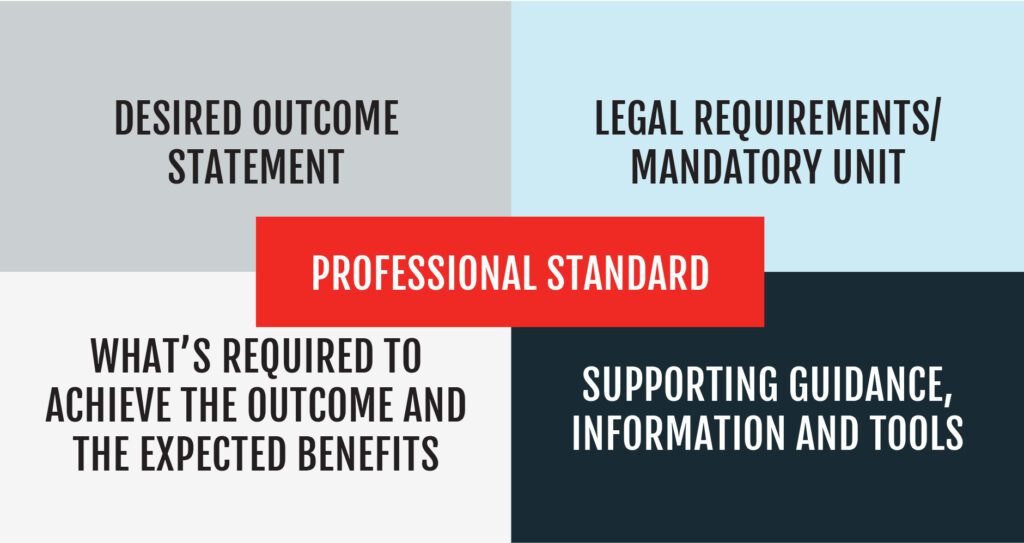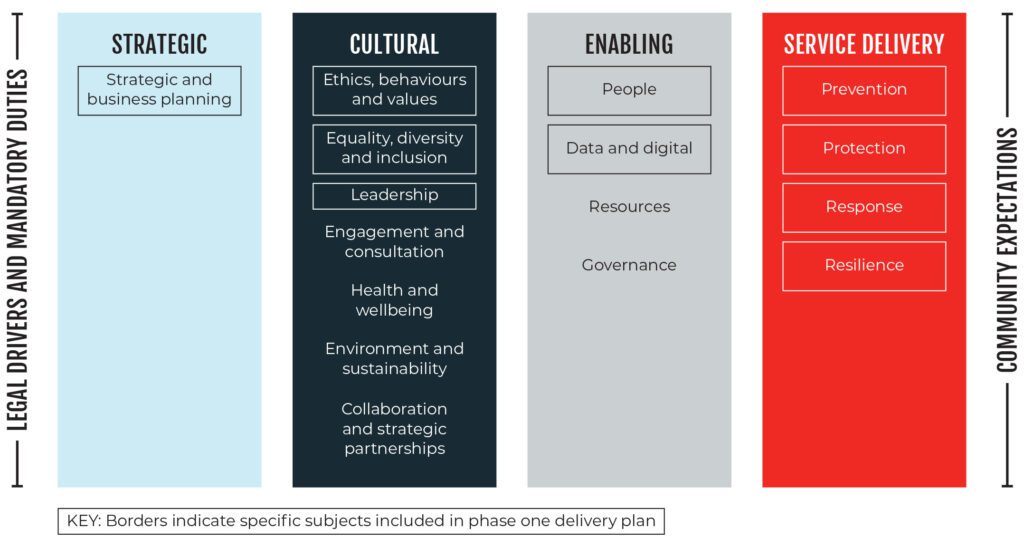PROGRESS TO DATE
Having been established in 2019, the Fire Standards Board has been busy determining how it will work, agreeing the process for developing Fire Standards, deciding what a Fire Standard will contain; identifying the range of Fire Standards to be developed and those Fire Standards that will be included in the initial cohort of published Fire Standards.
The Board plays a vital and independent role in ensuring that Fire Standards;
- reflect the most important issues that services need to address;
- have been developed using a high-quality approach;
- fully take into account the views of those who will use them and other stakeholders;
- have undergone a form of impact assessment to ensure potential impacts on fire and rescue services are known and understood; and have been appropriately assured by a credible external body.
The Board will keep each Standard under careful review as it is being developed.
OUR APPROACH
The Board is intent on ensuring that Fire Standards are focused on achieving positive outcomes, consistently applied nationally being underpinned by national guidance, tools and supporting information. The suite of Fire Standards will establish “what good looks like” and will become part of the inspectorate body for England’s (HMICFRS) inspection framework.
The Board recognises that to achieve this successfully Fire Standards will need to be easily understood by all audiences. Service engagement, both operational and non-operational, individually and collectively is crucial to achieving this.
The development of Fire Standards will be co-ordinated by the National Fire Chiefs Council (NFCC) through their Central Programme Office (CPO). The NFCC can provide the necessary structure needed to help co-ordinate the work by aligning it with its own work programmes and committees and additionally provide access to the invaluable network of subject matter experts that the Board needs to lead and inform development work. Where possible, existing work will be the foundation for Fire Standards development.
The Board will keep each Fire Standard under review as it is being developed. Full quality assurance will be done before the Board gives its final approval.
WORKING WITH STAKEHOLDERS
Engagement with stakeholders is key in helping inform, peer review and add value to the Fire Standards development process. Open consultations will be an important and essential part of the development process in which all stakeholders will be encouraged to engage.
The NFCC’s relatively new Strategic Engagement Forum is where formal engagement with key stakeholder organisations will take place. In addition, appropriate representatives from stakeholder organisations will be invited to engage during the development process including the drafting of guidance and tools.
THE FIRE STANDARD FORMAT
The Fire Standard format (structure and design) will be consistent across all Fire Standards and will be composed of a number of component parts as shown in the following diagram:

Once a Fire Standard is approved, it will be available on the Fire Standards Board’s website.
CATEGORISING THE FIRE STANDARDS
To help categorise the areas requiring Fire Standards and the guidance that is likely to underpin them, an Activity Framework has been developed. In doing this we were able to capture all the activities performed by fire and rescue services irrespective of their governance model, budget or location and who provides those functions (for example, services that are part of a local authority).
The principles of this approach are founded on the experience gained through and success of the National Operational Guidance programme (NOG) – developed by the services, for the services.
The principles of this approach are founded on the experience gained through the National Operational Guidence Programme (NOGP). The Activity Framework is intended to:
- provide a completee road map so we can see where the NFCC and FSB are going;
- help us avoid duplication and overlap which may result in conflicting guidence if developed in isolation; and,
- be easy to navigate for all audiences.
THE FIRE AND RESCUE SERVICE ACTIVITY FRAMEWORK
The Activity Framework covers all fire and rescue services’ functions and business activities with the top-level activities shown below. Each of these then expands into multiple levels.

A version of the Activity Framework will soon be available on the Fire Standards Board’s website.
Services have expressed concerns about what the suite of Fire Standards will contain and how they will achieve them. Services should be assured that the Board has no intention of producing Fire Standards that are not necessary. Where there are clear industry benchmarks or existing standards, then the Fire Standards will direct services towards them. This will be part of the scoping and drafting phase for each Fire Standard.
PRIORITISING FIRE STANDARDS DEVELOPMENT
Having decided what Fire Standards need to be developed, the next step for the Board was to decide the order in which individual Fire Standards should be developed.
The NFCC has created a Strategic Improvement Model (SIM) using evidence from various sources to help it determine what might assist in improving the future performance of the fire and rescue service. Their analysis took into particular account the recent findings and recommendations by HMICFRS and the findings and recommendations from the Grenfell Tower Inquiry phase one report.
The Board used this material to help it decide the order in which Fire Standards would be developed. The Board anticipates that work over the coming months will clarify even further what is likely to be included in each phase of Fire Standards development.
PHASE 1 DELIVERY PLAN
At its last meeting in April, the Board commissioned work on the first phase of Fire Standards, which is summarised in the diagram below. Work is already underway on many of these.
The initial Fire Standards to be developed include:

Operational response which will become three separate Fire Standards:
1. Operational preparedness – this Fire Standard will cover the strategic actions that are defined within National Operational Guidance (NOG) to support the completion of competent incident management.
2. Operational Competence – this Fire Standard will cover the hazards and control measures at tactical level contained in NOG which are appropriate to the roles of firefighters to enable them to achieve competent incident management.
3. Operational Learning – this Fire Standard will cover the need for every service to embed learning in its operational response. This will strengthen the national approach to operational learning and drive better use of the National Operational Learning (NOL) system.
Fire Standards relating to People will include areas such as ethics, behaviours and values, as well as leadership, recruitment and succession planning. Fire Standards covering risk management planning, fire protection, prevention Interventations and data requirements will drive improved service delivery and consistency of approach.
TESTING THE PROCESS – A PILOT CONSULTATION
The consultation on the first proposed Fire Standard, which was on emergency response driving, concluded at the end of January 2020 to which nearly 80 organisations and individuals responded. This consultation provided the Board with helpful insights into how well the Fire Standard development and consultation process works.
FORWARD LOOK
In light of the current UK lockdown arrangements because of the COVID-19 pandemic, the Board appreciates the pressure that fire and rescue services are currently under with their workforces stretched and understandably focussed on local challenges and priorities. This will inevitably cause some delays in making progress, but the Board is still determined and hopeful that progress can continue to be made.
The Board also recognises that learning from the response to COVID-19 will need to be considered which may have an impact on priorities for Fire Standards development.
Whilst coming together physically may be an issue, much can be achieved by working remotely and virtually. The Board encourage services and stakeholders to engage with consultations when they are published. All information about consultations will be shared via the Board’s website.
Further information will be available after the next Board meeting scheduled for June when it is intended that a number of draft Fire Standards will be shared and the next round of consultations are expected to start.